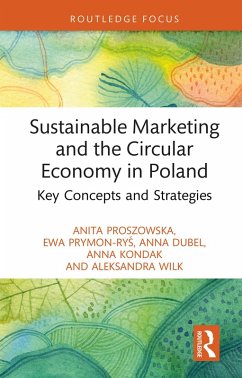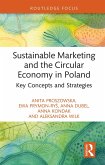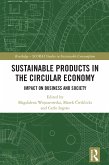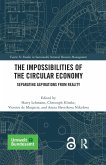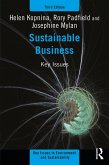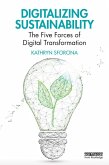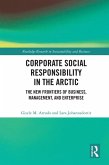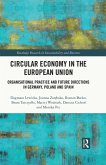Anita Proszowska, Ewa Prymon-Rys, Anna Dubel, Anna Kondak, Aleksandra Wilk
Sustainable Marketing and the Circular Economy in Poland (eBook, PDF)
Key Concepts and Strategies
21,95 €
21,95 €
inkl. MwSt.
Sofort per Download lieferbar

11 °P sammeln
21,95 €
Als Download kaufen

21,95 €
inkl. MwSt.
Sofort per Download lieferbar

11 °P sammeln
Jetzt verschenken
Alle Infos zum eBook verschenken
21,95 €
inkl. MwSt.
Sofort per Download lieferbar
Alle Infos zum eBook verschenken

11 °P sammeln
Anita Proszowska, Ewa Prymon-Rys, Anna Dubel, Anna Kondak, Aleksandra Wilk
Sustainable Marketing and the Circular Economy in Poland (eBook, PDF)
Key Concepts and Strategies
- Format: PDF
- Merkliste
- Auf die Merkliste
- Bewerten Bewerten
- Teilen
- Produkt teilen
- Produkterinnerung
- Produkterinnerung

Bitte loggen Sie sich zunächst in Ihr Kundenkonto ein oder registrieren Sie sich bei
bücher.de, um das eBook-Abo tolino select nutzen zu können.
Hier können Sie sich einloggen
Hier können Sie sich einloggen
Sie sind bereits eingeloggt. Klicken Sie auf 2. tolino select Abo, um fortzufahren.

Bitte loggen Sie sich zunächst in Ihr Kundenkonto ein oder registrieren Sie sich bei bücher.de, um das eBook-Abo tolino select nutzen zu können.
Sustainable Marketing and the Circular Economy in Poland outlines the specific challenges around formulating an organisation's marketing strategy in line with the circular economy framework.
- Geräte: PC
- mit Kopierschutz
- eBook Hilfe
Andere Kunden interessierten sich auch für
![Sustainable Marketing and the Circular Economy in Poland (eBook, ePUB) Sustainable Marketing and the Circular Economy in Poland (eBook, ePUB)]() Anita ProszowskaSustainable Marketing and the Circular Economy in Poland (eBook, ePUB)21,95 €
Anita ProszowskaSustainable Marketing and the Circular Economy in Poland (eBook, ePUB)21,95 €![Sustainable Products in the Circular Economy (eBook, PDF) Sustainable Products in the Circular Economy (eBook, PDF)]() Sustainable Products in the Circular Economy (eBook, PDF)44,95 €
Sustainable Products in the Circular Economy (eBook, PDF)44,95 €![The Impossibilities of the Circular Economy (eBook, PDF) The Impossibilities of the Circular Economy (eBook, PDF)]() The Impossibilities of the Circular Economy (eBook, PDF)0,00 €
The Impossibilities of the Circular Economy (eBook, PDF)0,00 €![Sustainable Business (eBook, PDF) Sustainable Business (eBook, PDF)]() Helen KopninaSustainable Business (eBook, PDF)41,95 €
Helen KopninaSustainable Business (eBook, PDF)41,95 €![Digitalizing Sustainability (eBook, PDF) Digitalizing Sustainability (eBook, PDF)]() Kathryn SforcinaDigitalizing Sustainability (eBook, PDF)34,95 €
Kathryn SforcinaDigitalizing Sustainability (eBook, PDF)34,95 €![Corporate Social Responsibility in the Arctic (eBook, PDF) Corporate Social Responsibility in the Arctic (eBook, PDF)]() Gisele M. ArrudaCorporate Social Responsibility in the Arctic (eBook, PDF)44,95 €
Gisele M. ArrudaCorporate Social Responsibility in the Arctic (eBook, PDF)44,95 €![Circular Economy in the European Union (eBook, PDF) Circular Economy in the European Union (eBook, PDF)]() Dagmara LewickaCircular Economy in the European Union (eBook, PDF)42,95 €
Dagmara LewickaCircular Economy in the European Union (eBook, PDF)42,95 €-
-
-
Sustainable Marketing and the Circular Economy in Poland outlines the specific challenges around formulating an organisation's marketing strategy in line with the circular economy framework.
Dieser Download kann aus rechtlichen Gründen nur mit Rechnungsadresse in A, B, BG, CY, CZ, D, DK, EW, E, FIN, F, GR, HR, H, IRL, I, LT, L, LR, M, NL, PL, P, R, S, SLO, SK ausgeliefert werden.
Produktdetails
- Produktdetails
- Verlag: Taylor & Francis eBooks
- Seitenzahl: 150
- Erscheinungstermin: 22. März 2024
- Englisch
- ISBN-13: 9781040034811
- Artikelnr.: 70181646
- Verlag: Taylor & Francis eBooks
- Seitenzahl: 150
- Erscheinungstermin: 22. März 2024
- Englisch
- ISBN-13: 9781040034811
- Artikelnr.: 70181646
- Herstellerkennzeichnung Die Herstellerinformationen sind derzeit nicht verfügbar.
Anita Proszowska (PhD) is an assistant professor in the Department of Business and Enterprise Management in the Faculty of Management, AGH University of Krakow. She is author of more than 90 scientific publications on marketing. She is a member of the Polish Scientific Marketing Association.
Ewa Prymon-Rys (PhD) is an assistant professor in the Department of Business and Enterprise Management in the Faculty of Management, AGH University of Krakow, Poland. She is author of more than 70 scientific articles and co-author of 2 books.
Anna Dubel (PhD) is an assistant professor in the Department of Finance and Accounting in the Faculty of Management, AGH University of Krakow, Poland.
Anna Kondak (PhD) is a research assistant in the Department of Business and Enterprise Management in the Faculty of Management, AGH University of Krakow, Poland.
Aleksandra Wilk (PhD) is a research assistant in the Department of Business and Enterprise Management in the Faculty of Management, AGH University of Cracow, Poland.
Ewa Prymon-Rys (PhD) is an assistant professor in the Department of Business and Enterprise Management in the Faculty of Management, AGH University of Krakow, Poland. She is author of more than 70 scientific articles and co-author of 2 books.
Anna Dubel (PhD) is an assistant professor in the Department of Finance and Accounting in the Faculty of Management, AGH University of Krakow, Poland.
Anna Kondak (PhD) is a research assistant in the Department of Business and Enterprise Management in the Faculty of Management, AGH University of Krakow, Poland.
Aleksandra Wilk (PhD) is a research assistant in the Department of Business and Enterprise Management in the Faculty of Management, AGH University of Cracow, Poland.
About Authors.
List of figures and tables.
Acknowledgments and Financial Disclosure.
Introduction..
Chapter 1. The circular economy - an outline of the concept and its evolution.
1.1. The circular economy concept.
1.2. Evolution of the circular economy concept.
1.3. Key objectives and results of a circular economy.
1.4. Circular economy implementation in word economies and mapping CE networks.
References
Chapter 2. The evolution of sustainable marketing against a background of selected market changes.
2.1. The evolution of the conventional understanding of marketing.
2.2. The beginnings of sustainable marketing and the green supply chain.
2.3. Sustainability and sustainable marketing: definitions and practical examples
2.4. Adverse consumer trends slowing the development of sustainable marketing.
2.5. Planned product obsolescence.
2.6. Greenwashing.
2.7. Trends supporting the development of sustainable attitudes
References
Chapter 3. The Main Sustainable Change Actors.
3.1. The concept of stakeholders
3.2. Groups of stakeholders in a circular economy and a sustainable change.
3.3. Consumers as benefactors and the main stakeholders in sustainable change.
3.4 The role of NGOs in a circular economy.
3.5 The corporate sector and its involvement in sustainable change.
3.6. Educators, academics and researchers promoting a circular economy.
3.7. The importance of influencers and celebrity endorsement.
3.8. Other sustainable stakeholders.
References
Chapter 4. Examples of activities of enterprises in a circular economy.
4.1. Methods: An overview of circular economy and sustainable marketing practices.
4.2. An overview of circular economy and sustainable marketing practices.
Conclusions.
References
List of figures and tables.
Acknowledgments and Financial Disclosure.
Introduction..
Chapter 1. The circular economy - an outline of the concept and its evolution.
1.1. The circular economy concept.
1.2. Evolution of the circular economy concept.
1.3. Key objectives and results of a circular economy.
1.4. Circular economy implementation in word economies and mapping CE networks.
References
Chapter 2. The evolution of sustainable marketing against a background of selected market changes.
2.1. The evolution of the conventional understanding of marketing.
2.2. The beginnings of sustainable marketing and the green supply chain.
2.3. Sustainability and sustainable marketing: definitions and practical examples
2.4. Adverse consumer trends slowing the development of sustainable marketing.
2.5. Planned product obsolescence.
2.6. Greenwashing.
2.7. Trends supporting the development of sustainable attitudes
References
Chapter 3. The Main Sustainable Change Actors.
3.1. The concept of stakeholders
3.2. Groups of stakeholders in a circular economy and a sustainable change.
3.3. Consumers as benefactors and the main stakeholders in sustainable change.
3.4 The role of NGOs in a circular economy.
3.5 The corporate sector and its involvement in sustainable change.
3.6. Educators, academics and researchers promoting a circular economy.
3.7. The importance of influencers and celebrity endorsement.
3.8. Other sustainable stakeholders.
References
Chapter 4. Examples of activities of enterprises in a circular economy.
4.1. Methods: An overview of circular economy and sustainable marketing practices.
4.2. An overview of circular economy and sustainable marketing practices.
Conclusions.
References
About Authors.
List of figures and tables.
Acknowledgments and Financial Disclosure.
Introduction..
Chapter 1. The circular economy - an outline of the concept and its evolution.
1.1. The circular economy concept.
1.2. Evolution of the circular economy concept.
1.3. Key objectives and results of a circular economy.
1.4. Circular economy implementation in word economies and mapping CE networks.
References
Chapter 2. The evolution of sustainable marketing against a background of selected market changes.
2.1. The evolution of the conventional understanding of marketing.
2.2. The beginnings of sustainable marketing and the green supply chain.
2.3. Sustainability and sustainable marketing: definitions and practical examples
2.4. Adverse consumer trends slowing the development of sustainable marketing.
2.5. Planned product obsolescence.
2.6. Greenwashing.
2.7. Trends supporting the development of sustainable attitudes
References
Chapter 3. The Main Sustainable Change Actors.
3.1. The concept of stakeholders
3.2. Groups of stakeholders in a circular economy and a sustainable change.
3.3. Consumers as benefactors and the main stakeholders in sustainable change.
3.4 The role of NGOs in a circular economy.
3.5 The corporate sector and its involvement in sustainable change.
3.6. Educators, academics and researchers promoting a circular economy.
3.7. The importance of influencers and celebrity endorsement.
3.8. Other sustainable stakeholders.
References
Chapter 4. Examples of activities of enterprises in a circular economy.
4.1. Methods: An overview of circular economy and sustainable marketing practices.
4.2. An overview of circular economy and sustainable marketing practices.
Conclusions.
References
List of figures and tables.
Acknowledgments and Financial Disclosure.
Introduction..
Chapter 1. The circular economy - an outline of the concept and its evolution.
1.1. The circular economy concept.
1.2. Evolution of the circular economy concept.
1.3. Key objectives and results of a circular economy.
1.4. Circular economy implementation in word economies and mapping CE networks.
References
Chapter 2. The evolution of sustainable marketing against a background of selected market changes.
2.1. The evolution of the conventional understanding of marketing.
2.2. The beginnings of sustainable marketing and the green supply chain.
2.3. Sustainability and sustainable marketing: definitions and practical examples
2.4. Adverse consumer trends slowing the development of sustainable marketing.
2.5. Planned product obsolescence.
2.6. Greenwashing.
2.7. Trends supporting the development of sustainable attitudes
References
Chapter 3. The Main Sustainable Change Actors.
3.1. The concept of stakeholders
3.2. Groups of stakeholders in a circular economy and a sustainable change.
3.3. Consumers as benefactors and the main stakeholders in sustainable change.
3.4 The role of NGOs in a circular economy.
3.5 The corporate sector and its involvement in sustainable change.
3.6. Educators, academics and researchers promoting a circular economy.
3.7. The importance of influencers and celebrity endorsement.
3.8. Other sustainable stakeholders.
References
Chapter 4. Examples of activities of enterprises in a circular economy.
4.1. Methods: An overview of circular economy and sustainable marketing practices.
4.2. An overview of circular economy and sustainable marketing practices.
Conclusions.
References
